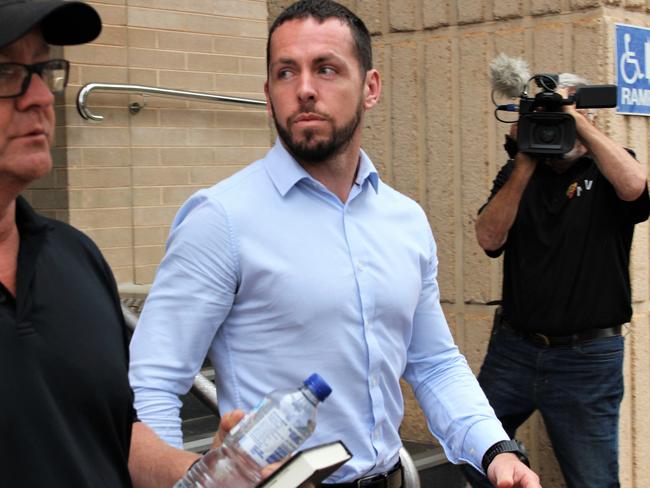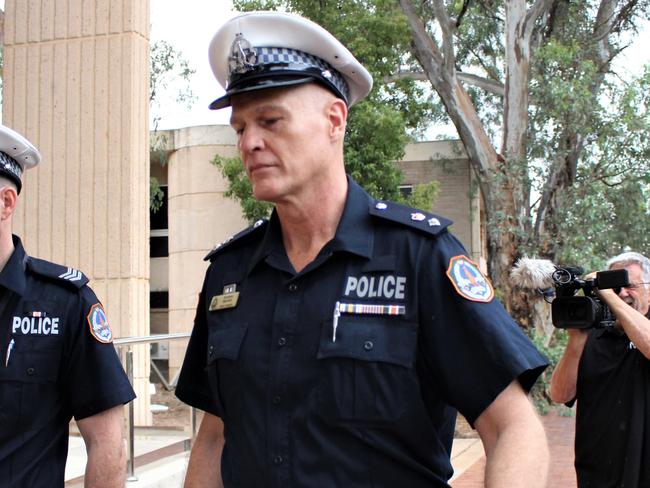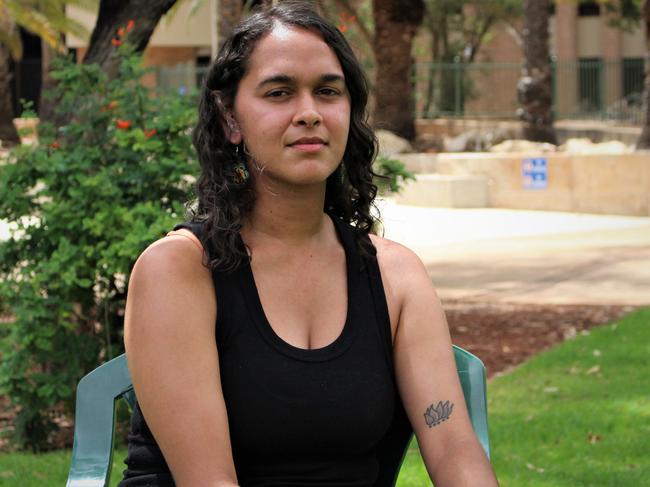Zach Rolfe trial witness denies changing story to ‘toe the line’ for the NT Police executive
Senior Sergeant Andrew Barram said the idea that he changed his story to please NT Police’s top brass ‘belongs with other conspiracy theories’.
Police & Courts
Don't miss out on the headlines from Police & Courts. Followed categories will be added to My News.
The use of force expert who testified for the prosecution in Zach Rolfe’s murder trial has dismissed a suggestion he changed his story “to toe the line by the executive” as a “conspiracy theory”.
Senior Sergeant Andrew Barram testified at an inquest into the death of Kumanjayi Walker on Friday after Constable Rolfe was acquitted on all charges in March over the fatal police shooting.
Counsel assisting the Coroner, Peggy Dwyer, played an excerpt of an interview Constable Rolfe gave to Channel 7’s Spotlight program in the wake of the acquittal in which he called into question aspects of Sergeant Barram’s earlier evidence.
Constable Rolfe told reporter Denham Hitchcock Sergeant Barram had been using “a model for a planned police response for a siege situation” to support his opinion that the killing was not justified, which was “not relevant”.
In response, Sergeant Barram told Dr Dwyer Constable Rolfe was “completely wrong”, saying while the model “originated as a siege response”, it was “applicable and scalable to just about every concern that police attend”.
In the interview, Constable Rolfe also suggested Sergeant Barram “got tripped up” after it was revealed the first of three shots he fired “was not incapacitating in a medical sense”.
“I think he was just willing to toe the line by the executive and it all got a bit sticky for him and he was out of his depth,” Constable Rolfe told the Spotlight program.

But Sergeant Barram said nothing had changed his opinion since the trial that the second and third shots were unjustified and denied in any way changing his story to “toe the line”.
“What do you think of that suggestion?” Dr Dwyer asked.
“It belongs with other conspiracy theories,” he replied.
In his evidence at the trial, Constable Rolfe claimed publicly for the first time that Mr Walker had reached for his Glock during the struggle, saying he twisted his hips and stepped back before drawing the weapon and firing.
When asked about that testimony by Dr Dwyer on Friday, Sergeant Barram said it was not consistent with police training.
“We train in firearm retention, and stepping back and twisting your hips is part of that, but keeping the gun in the holster is the training, so that’s where it’s the least risk to yourself or anyone else,” he said.
Dr Dwyer said, in his trial testimony, Constable Rolfe had maintained he could see Mr Walker’s right arm moving with a pair of scissors in his hand when he fired the second and third shots.
Sergeant Barram’s trial evidence came before Constable Rolfe’s so he was not asked about that scenario at the time but Dr Dwyer asked him whether he now accepted it as a possibility.
“Not in the position they were in,” he said.
“So you maintain the evidence that you gave in your statements and at trial that the second and third shots were excessive and that there were other options available at the time?” Dr Dwyer asked.
“Yes,” Sergeant Barram replied.
Earlier, the court heard the police operation that resulted in the death of Kumanjayi Walker was an “abject failure” that will have a “ripple effect for the community and the police force for many years”.
Territory Coroner Elisabeth Armitage is presiding over a months’ long inquest in the Alice Springs Local Court into the death of Kumanjayi Walker in Yuendumu in 2019.
The 19-year-old Warlpiri-Luritja man was killed when he was shot three times by Constable Zach Rolfe during a bungled attempted arrest for breaching a suspended sentence and assaulting police.
Constable Rolfe was acquitted on all charges over the shooting by a Supreme Court jury in March.
On Friday, NT Police use of force expert Senior Sergeant Andrew Barram told the inquiry he had reviewed 46 incidents involving Constable Rolfe prior to the fatal confrontation, five of which he deemed to involve excessive force.
But Sergeant Barram said he was not aware of an incident in which Constable Rolfe had slammed a wheelie bin containing a 14-year-old boy to the ground as it had not been reported as a use of force, and he did not know how many other such incidents may have occurred.
Sergeant Barram told counsel assisting the Coroner, Peggy Dwyer, he stood by statements given to investigating police in March 2020 after conducting his review.
“Having reviewed historical use of force incidents in which Constable Zachary Rolfe has been involved, I do not believe he endeavours to bring about peaceful resolutions to some incidents, and instead, uses quite heavy handed tactics,” he said in the statement.
“I have identified five incidents in which, in my opinion, the force used by Constable Rolfe was excessive and inconsistent with the use of force philosophy and the 10 operational safety principles.
“In these five incidents Constable Rolfe chose to use a tactical option that was not reasonable, necessary, proportionate and appropriate to the circumstances.
“Constable Rolfe’s choice of tactical options in these cases has resulted in injuries to subjects, and the potential for injury to himself, which could easily have been avoided.”

Sergeant Barram said he also stood by comments that Constable Rolfe consistently failed to use effective communication to defuse situations and “appears to prefer to go hands on”.
“The result is that in the matters reviewed, force is used where none is needed,” he said in the statement.
“It is my view that Constable Rolfe interprets any noncompliance or lack of co-operation as a threat and therefore responds with a higher level of force than would be reasonably considered necessary in the circumstances.
“Constable Rolfe also demonstrated a tendency to want to get his man no matter what and pays little or no regard to the consequences of his actions, which has resulted in quite severe and totally unnecessary injuries to suspects in some cases.”
Sergeant Barram agreed with Dr Dwyer that the attempted arrest of Mr Walker in 2019 amounted to an “abject failure” which resulted in the “absolute worst possible outcome”.
“Do you agree that that tragedy was not only profound for the family of Kumanjayi himself, but it has a ripple effect for the community and the police force for many years and we’ve seen that with Kumanjayi’s tragic passing?” she asked.
“Unfortunately we have,” Sergeant Barram replied.
Meanwhile, lawyers for Constable Rolfe took aim at comments made by Mr Walker’s cousin after the officer exercised his legal right not to answer questions that could expose him to internal police disciplinary proceedings.
Barrister Luke Officer told the court his client had done “no more than what any witness who comes before this court might do in the circumstances”.

Mr Officer said he was “troubled” by comments made by Samara Fernandez-Brown and reported in the NT News “that what Constable Rolfe did on Wednesday was disgraceful or a cop out”.
He said the comments were “inflammatory” and “divisive” and “not a true reflection of what occurred in your court on Wednesday”.
“Those comments are extraordinarily unhelpful to your honour’s investigation,” he said.
“All that Constable Rolfe did on Wednesday was assert a right that he is entitled to do as anybody is, nothing more, nothing less.”
On Wednesday, Dr Dwyer had asked Constable Rolfe whether a text message in which he had referred to Aboriginal people as “c**ns” was “obviously racist”.
“I wish to exercise my right and claim penalty privilege on the basis my answers might tend to expose me to a penalty,” he replied.
The inquest continues on Monday.





